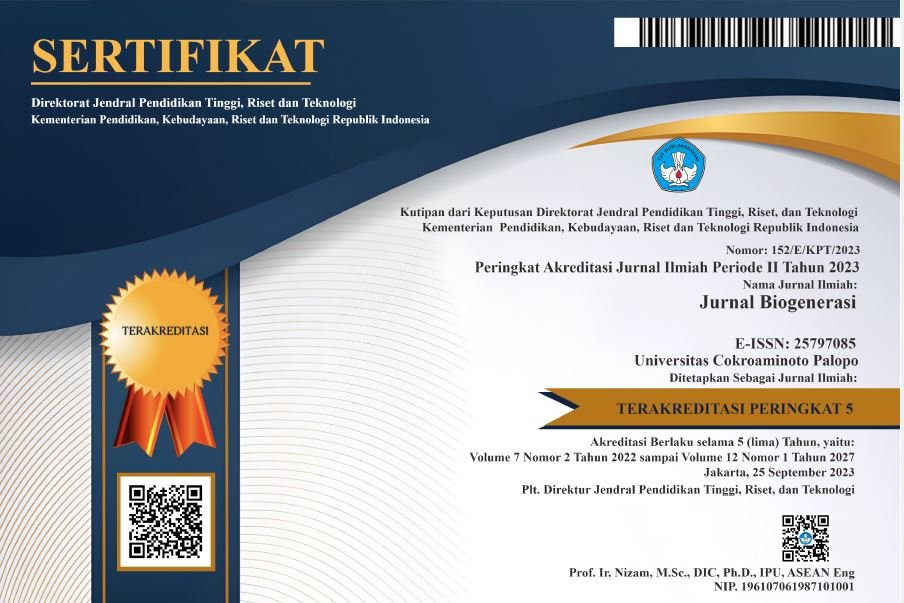PENGARUH PEMBELAJARAN BERBASIS PROJEK PADA MATA PELAJARAN LANSKAP DAN PERTAMANAN DALAM DIMENSI PROFIL PELAJAR PANCASILA DI SMK NEGERI 1 BAWEN
DOI:
https://doi.org/10.30605/biogenerasi.v10i2.5560Keywords:
Project Based Learning (PjBL), Pancasila Student Profile, Landscape and GardeningAbstract
The Merdeka Curriculum is a curriculum that is contextualised to current conditions. It is hoped that with a contextualised project base that is applied, students can better implement knowledge in everyday life. The purpose of this study is to analyse the relationship between the implementation of PjBL and learning activities in Landscape and Landscaping subjects. This type of research is descriptive qualitative with the research subjects being students of Class XI ATP B at SMK Negeri 1 Bawen. The technique used is convenience sampling with an observation sheet instrument. The results of PjBL application can be seen in the learning activities and daily life of the students in school. In addition, the use of PjBL can also promote and develop the attitudes that exist in the dimensions of the Pancasila Student Profile.
Downloads
References
Badan Standar Kurikulum dan Asesmen Pendidikan. (2022). Panduan Pengembangan Proyek Penguatan Profil Pelajar Pancasila. Jakarta. Kemendikbudristek.
Febrian, A., Wandra, B. F., Zalvia, E. T., Simanungkalit, E. W., Novita, N. F., Miranda, O., Kurniawan, R., Jannah, R., & Syamsir, S. (2023). Pengaruh Kepemimpinan Terhadap Pergaulan Teman Sejawat Dalam Kelas Kepemimpinan Departemen Ilmu Administrasi Negara tahun masuk 2021. Journal of Management and Innovation, 2(6), 963-971.
https://doi.org/10.58344/jmi.v2i6.251
Haniifah, A., Harsan, T., & Murtiningsih, I. (2024). Efektivitas literasi budaya dan kewargaan dalam meningkatkan kebhinekaan global di SMP. Edukatif: Jurnal Ilmu Pendidikan, 6(5), 5792–5803. https://edukatif.org/index.php/edukatif/index
Hutabarat, H. H. (2022). Analisis penerapan kurikulum merdeka belajar di SMA Negeri Sekota Padangsidimpuan. JURNAL MathEdu (Mathematic Education Journal) 5(3), 58-69. https://doi.org/10.37081/mathedu.v5i3.3962
Kamdi, W. (2010). Implementasi Project-Based Learning di Sekolah Menengah Kejuruan. JURNAL PENDIDIKAN DAN PEMBELAJARAN 17(1), 98-110.
Mahardika, A. (2017). PENANAMAN KARAKTER BANGSA BERBASIS KEARIFAN LOKAL DI SEKOLAH. Jurnal Pendidikan Kewarganegaraan 7(2), 16-27. http://dx.doi.org/10.20527
Lestari, S., & Yuwono, A. A. (2022). Coaching untuk meningkatkan kemampuan guru dalam menerapkan pembelajaran berbasis proyek (Project Based Learning). Jombang, Jawa Timur. Kun Fayakun.
Minarti, I. B., Nurwahyunani, A., Fajriyah, S. A., Sholekhah, S. D., Ardian, V. V. K., Lestari, S. A., & Firdaus, D. H. (2023). Integrasi model Problem Based Learning (PBL) dalam meningkatkan hasil belajar dan motivasi siswa di Indonesia. Numbers: Jurnal Pendidikan Matematika dan Ilmu Pengetahuan Alam, 1(2), 44–54. https://mathedu.joln.org/index.php/edu/article/view/32/44
Oktariani, Linda H, Siti R, Dessy W. 2022. Pengaruh Model Pembelajaran Terhadap Perkembangan Pendidikan di Sekolah. SALIMIYA: Jurnal StudiI lmu Keagamaan Islam 3 (2), 1-10. https://ejournal.iaifa.ac.id/index.php/salimiya/article/view/682
Yulia, A.W. (2022). Melalui Model Projects Based Learning Metode Diskusi Kelompok untuk Mengoptimalisasi Aktifitas Dan Hasil Belajar Peserta didik Pada Mapel PPKn, Materi Harmoni dalam Keberagaman Sosial, Budaya, Gender dalam Bingkai Bhineka Tunggal Ika Kelas IX.4 MTsN 1 Payakumbuh Semester Genap T.P. 2021/2022. Journal on Education 05(01), 126-136. https://doi.org/10.31004
Downloads
Published
How to Cite
Issue
Section
License
In submitting the manuscript to the journal, the authors certify that:
- They are authorized by their co-authors to enter into these arrangements.
- The work described has not been formally published before, except in the form of an abstract or as part of a published lecture, review, thesis, or overlay journal.
- That it is not under consideration for publication elsewhere,
- That its publication has been approved by all the author(s) and by the responsible authorities – tacitly or explicitly – of the institutes where the work has been carried out.
- They secure the right to reproduce any material that has already been published or copyrighted elsewhere.
- They agree to the following license and copyright agreement.
License and Copyright Agreement
Authors who publish with this journal agree to the following terms:
- Authors retain copyright and grant the journal right of first publication with the work simultaneously licensed under Creative Commons Attribution License (CC BY 4.0) that allows others to share the work with an acknowledgment of the work's authorship and initial publication in this journal.
- Authors are able to enter into separate, additional contractual arrangements for the non-exclusive distribution of the journal's published version of the work (e.g., post it to an institutional repository or publish it in a book), with an acknowledgment of its initial publication in this journal.
- Authors are permitted and encouraged to post their work online (e.g., in institutional repositories or on their website) prior to and during the submission process, as it can lead to productive exchanges, as well as earlier and greater citation of published work.


.png)

